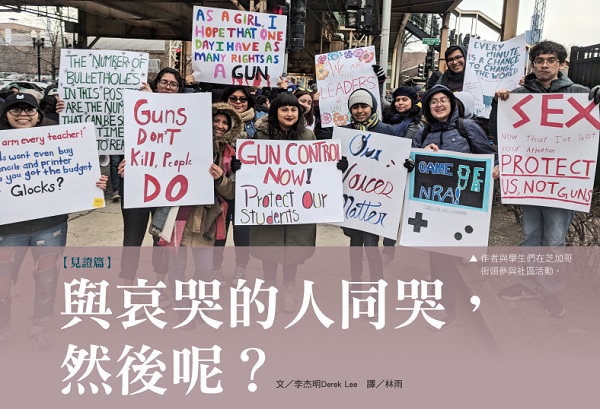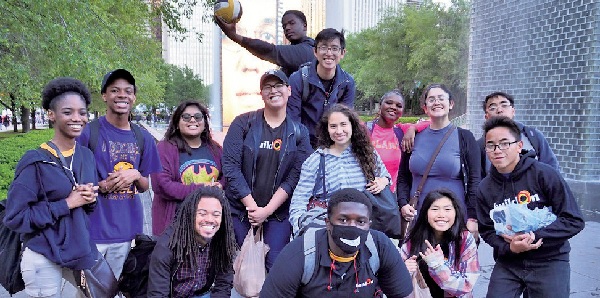Weep with those who weep, and then what?
【Witness】
Translated by Lin Yu

▲The author’s students participated in a “pro-life” demonstration in Chicago.
Stand side by side with students
After the shooting at Marjory Stoneman Douglas High School in Parkland, Florida, in February, I marched with my high school students in Chicago. Thousands of people in the Chicago area, many of them high school students, also participated in the march to protest gun violence in the United States.
Many of these students come from different schools and communities. Even if they have not been exposed to gun violence in their lives, they are willing to spend several hours riding the bus to participate in this parade. Most of these students come from affluent communities with functioning local governments that are always looking out for the best interests of their students, a background similar to the students at Douglas High School. Douglas High School is an outstanding school in Florida, ranking 38th in the state. However, because of this violent incident, the lives of students were shaken, and many were forced to become the new faces of the movement against gun violence.
The demonstration site where I stood side by side with the students was only a few bus stops away from the school where I teach. For some reason, even though we are standing in the city where we live, we still feel out of place; among these passers-by who have driven long distances to participate in the parade and will later return to their safe communities, we feel an indescribable sense of loss.
Compared with these young people who have not experienced the storm, my students have had to coexist with gun violence since birth; they live in neighborhoods where gunshots are heard every night. Last school year alone, three students died in separate shootings. This is a common occurrence in the community where I live. It is not easy to comfort students who have lost friends while also dealing with the same internal struggles themselves.
Jesus cried
As Christians, we must ask what the role of the church is. It is regrettable that we have become accustomed to posting on Facebook: "Praying for the families of the victims." But there is a lack of actual actions. As Christians we are called to do something higher and deeper. Two passages in the Gospels express our identity very well. The first is about the resurrection of Lazarus:
When Martha had said this, she went back and called her sister Mary privately, saying, "The Master has come to call you." When Mary heard this, she got up quickly and came to Jesus. At that time Jesus had not yet entered the village, and was still where Martha met him. When the Jews who were with Mary at home comforting her saw her getting up and going out in a hurry, they followed her, thinking that she was going to the tomb to weep. When Mary came to Jesus and saw him, she fell at his feet and said, "Lord, if you had been here, my brother would not have died."
When Jesus saw her weeping, and the Jews who were with her weeping, he groaned inwardly and was greatly troubled, and said, "Where have you laid him?" They answered him, "Lord, come and see." Jesus wept. . The Jews said to him, "Look how much he loved this man!" One of them said to them, "Since he opened the blind man's eyes, could he not have saved this man from death?" Again Jesus came to the tomb, lamenting in his heart. The tomb was a hole, blocked by a stone. Jesus said to him, "Take away the stone." Martha, the sister of the dead man, said to him, "Lord, he must stink now, for he has been dead four days." Jesus said to him, "I am not against you. Did you say that if you believe, you will see the glory of God?”
So they removed the stone. Jesus raised his eyes to heaven and said, "Father, I thank you because you have heard me. I also know that you always hear me, but I say this for the sake of everyone who is standing around, so that they may believe that you have sent me. Come." When he had said this, he shouted with a loud voice, "Lazarus, come out!" Then the dead man came out, his hands and feet wrapped in cloth, and his face wrapped in a handkerchief. Jesus said to them, "Loove him and let him go!" (John 11:28-44)
This is the famous account of the healing of Lazarus. The name "Lazarus" has become synonymous with "resurrection and miracles." However, when I read this passage, the most vivid thing is not the resurrection of Lazarus, but the compassion, empathy, and love of Jesus. This is the truly divine highlight of the story.
When Jesus came to the house of Mary and Martha, the two sisters were filled with despair and ran to Jesus crying. They told Him that if Jesus had come earlier, Lazarus would not have died. Looking at the weeping sisters, Jesus' spirit was deeply moved and extremely sad.
Jesus wept.
I was greatly shocked. In the verses preceding the same chapter, Jesus Himself said that Lazarus was to be healed. As Jesus approached Mary and Martha, He knew full well that Lazarus would soon be up and walking, and the hope and faith of the entire village would be restored.
But Jesus allowed himself to cry.
He saw Mary's "mourning" and entered into this "mourning" and stood side by side with her. Seeing Jesus' tears, the Jews in the village declared, "See how much He loves this man!" Christ showed His love not in the power of raising Lazarus, but in His sorrow.
The language of Christian sorrow has been lost to time. We forget how to hurt and only allow positive emotions to accompany our spiritual journey. But as we follow in the footsteps of Christ, He calls us to weep with those who weep. Although comfort and revitalization are necessary processes for healing, sometimes we don't need to rush to comfort and relieve ourselves. Instead, we must allow ourselves to truly feel the pain and sadness of the other person first.
Christ came not as a conquering King but as a suffering Servant.

▲The author and students participated in community activities on the streets of Chicago.
Rise up and do righteousness
My experience in youth development has shown me the strong ostrich mentality among them. My students are so used to seeing their classmates being shot or losing their lives to mental illness, "It's only three this year, so that's not so bad!" they would say, meaning that losing three lives is considered good news. We cannot remain indifferent to the weight of sin; we must use our words of sorrow to convey Christ's sorrow for every life lost.
Although I have a strong ostrich mentality, my students have also become my role models in terms of actions. Although attention is currently focused on recent tragic school shootings, gun violence is a chronic problem among high school students. The vast majority of students are from ethnic minorities, many of whom are from immigrant families from Mexico or China, as well as undocumented black families. For such people, they never get to "choose" whether to take action against gun violence. They never get a permit from their school to attend an anti-gun violence march in a distant city. This option does not exist because they have already been thrust into a situation where they must grapple with this issue head on. Like it or not, the choice has been made for them. For these students, black and brown, when they see adults unwilling to change anything, they have to take action.
I must admit, seeing how difficult it is to change, I also fell into despair, crying with those who cried, gritting my teeth to face the next tragedy. For students, however, mourning is just that and action is necessary. If the adults don't take the lead, they will do it themselves. This leads to the second verse, which is Jeremiah’s prophecy referring to the New Testament era:
“A loud wailing was heard in Ramah; Rachel was weeping for her children and would not be comforted, because they were no longer there.” (Matthew 2:18)
This passage comes immediately after Herod ordered the execution of children under the age of two in Bethlehem. The symbolic Rachel mourns her loss and refuses to be comforted. Comfort was of little use to Rachel because her children had been killed; comfort was absolutely unsatisfying and Rachel wanted justice for her children.
Likewise, today's teenagers are no longer satisfied with just being "comforted." For their own destiny, they have no choice but to rise up and fight for justice. The next step is to see whether we adults are willing to join them in the fight for justice.
Christ calls us to imitate Him in all we do, especially these two things—
First, Jesus calls us to weep with those who weep. Christ's love draws us into the space of pain, where we are forced to intensely empathize with those who are hurting. Perhaps then they will say, "Look, how much they love these people!" and testify to the love of Christ in us.
Second, Jesus wants us to go a step further in practicing righteousness. Comfort and mercy are needed, but we are called to walk with those who are hurting.
The nation's youth are moving forward. As the body of Christ, do you and I join in and become witnesses of prophecy?
 Derek Lee serves as the service learning ministry liaison at buildOn, serving at Curie Metro Public High School on the South Side of Chicago. The purpose of "Build" is to break the cycle of poverty, illiteracy, and low expectations through service and education. He often volunteers on weekends with students in Chicago and overseas. His ministry at Build also includes leading workshops on social issues such as political activism and gun violence in Chicago.
Derek Lee serves as the service learning ministry liaison at buildOn, serving at Curie Metro Public High School on the South Side of Chicago. The purpose of "Build" is to break the cycle of poverty, illiteracy, and low expectations through service and education. He often volunteers on weekends with students in Chicago and overseas. His ministry at Build also includes leading workshops on social issues such as political activism and gun violence in Chicago.
Translator profile: Lin Yu, a writer, is willing to build bridges across cultures through translation.
